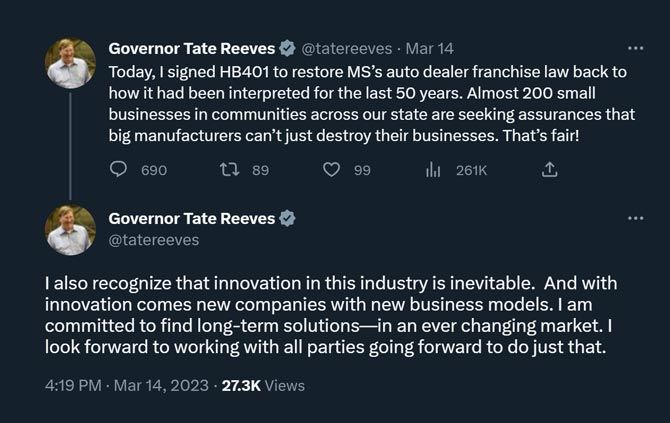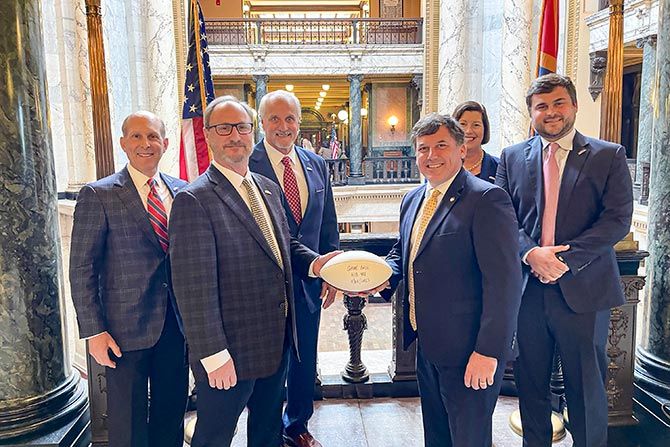What has been called the most important legislation ever championed at the Mississippi Capitol by MADA was accomplished when Governor Tate Reeves signed HB 401 into law on March 14, 2023. The new law will go into effect on July 1, 2023.
Although MADA has worked on franchise laws for years, this one was different. In the past, there has not been much public interest in franchise law legislation at the Capitol because it was centered around issues specific to manufacturers and automobile dealerships. But because our law involved electric vehicle companies that hired lobbyists to oppose HB 401, this turned out to be a real fight under the dome.
There were three different interest groups engaged in the legislative efforts: our dealerships, traditional manufacturers and three electric vehicle (EV) companies (Tesla, Rivian and Lucid).
The need for HB 401 has been misunderstood by a lot of people. The electric vehicle companies made the argument that car dealers were anti-EV, and HB 401 would block Mississippians from being able to buy their vehicles. This, of course, was clearly a false narrative. The fight was never about blocking EV companies from selling their vehicles or coming to Mississippi. The legislation was needed to address the loophole that Tesla created when they came to Mississippi and circumvented 50 years of franchise law.
In 2019, Tesla filed for a dealer and manufacturer’s license at the Mississippi Motor Vehicle Commission (MMVC). The Commission informed Tesla that they could not have a dealer’s license because the law requires a bona fide contract between the dealer and manufacturer as part of the application. The next step Tesla took was to form a strawman company (Tesla Mississippi, LLC) with the Secretary of State. After doing so, they contracted with themselves as a manufacturer and filed an application for a dealer’s license at the Commission under Tesla Mississippi, LLC.
The Commission turned to Attorney General Lynn Fitch for an opinion on whether Tesla’s actions were permissible under the franchise law. In essence, could Tesla contract with themselves to receive a dealer’s license? In short, Attorney General Fitch opined that Tesla’s actions were not in violation of the law. Attorneys for MADA, as well as other legal scholars, believe that the Attorney General’s opinion was flawed.

After the MMVC received the opinion, they granted the dealership license to Tesla Mississippi, LLC.
Within a few months, 50 years of franchise law was destroyed. Mississippi was the only state in the country where any automobile manufacturer could form an LLC and contract with themselves to receive a dealer’s license. This created a disastrous precedent, and the future of Mississippi’s dealerships was at stake.
Dealers go out and compete for customers every day for sales and service, but there is no way a dealership could survive if a factory opened a dealership across the street in direct competition.
Mississippi would lose without locally-owned car dealerships. The franchise law has been good for Mississippi. One of the key staples of the franchise law is to prevent monopolies. The law has created small businesses across the state to serve the essential transportation needs of Mississippians. It is independently documented that customers save hundreds of dollars on the purchase of a new automobile when dealers compete. Mississippi has 218 dealerships that produce 18,073 jobs and donate millions of dollars in community support.
As our elected officials became educated on the issue, they understood that we needed one set of rules and a fair playing field for all dealerships. EV companies wanted their own set of rules.

What does the law do?
Automobile manufacturers cannot do any of the following:
- Own any ownership interest in, operate, or control any motor vehicle dealer or dealership in the state for the same type of classification of motor vehicle that it manufactures or distributes;
- Apply for a motor vehicle dealer’s license; or
- Be licensed as a new motor vehicle dealer in the state.
The Tesla corporate-owned store that received a dealer’s license in 2021 will be allowed to keep its current location.
Contrary to what has been reported and said by the opposition, HB 401 does not block or prevent any of the following:
- Any Mississippian from purchasing a vehicle online
- Electric vehicle companies from opening service centers. In fact, when Tesla first came to Mississippi, they opened a service center in Pearl.
- The sale of electric vehicles in Mississippi
Some of the main opponents voted against this bill because they said it was anti-free market. With all the subsidies that have been granted to electric vehicle companies and now a $7,500 tax credit for electric vehicles, this can only be viewed as a laughable argument.
The signing of HB 401 was a monumental legislative victory that was led by MADA. These achievements are never accomplished without a lot of effort from many individuals. Chairman Jeff Field did an outstanding job keeping the MADA leadership team engaged and focused. The dealer body reached out to elected officials and ignited a grassroots effort that could not be overcome by the opposition. Speaker Philip Gunn, Chairman Trey Lamar, and Speaker Pro Tem Jason White are to be commended for their efforts in the House of Representatives. Lieutenant Governor Delbert Hosemann, Senator Daniel Sparks, and Chairman Josh Harkins were instrumental in getting the bill through the Senate. Governor Tate Reeves recognized the importance of car dealers to Mississippi and signed the bill.
While it is important to recognize and celebrate this achievement, this fight is not over. We will continue to fight for Mississippi and make a difference through our 218 dealerships in Mississippi.







